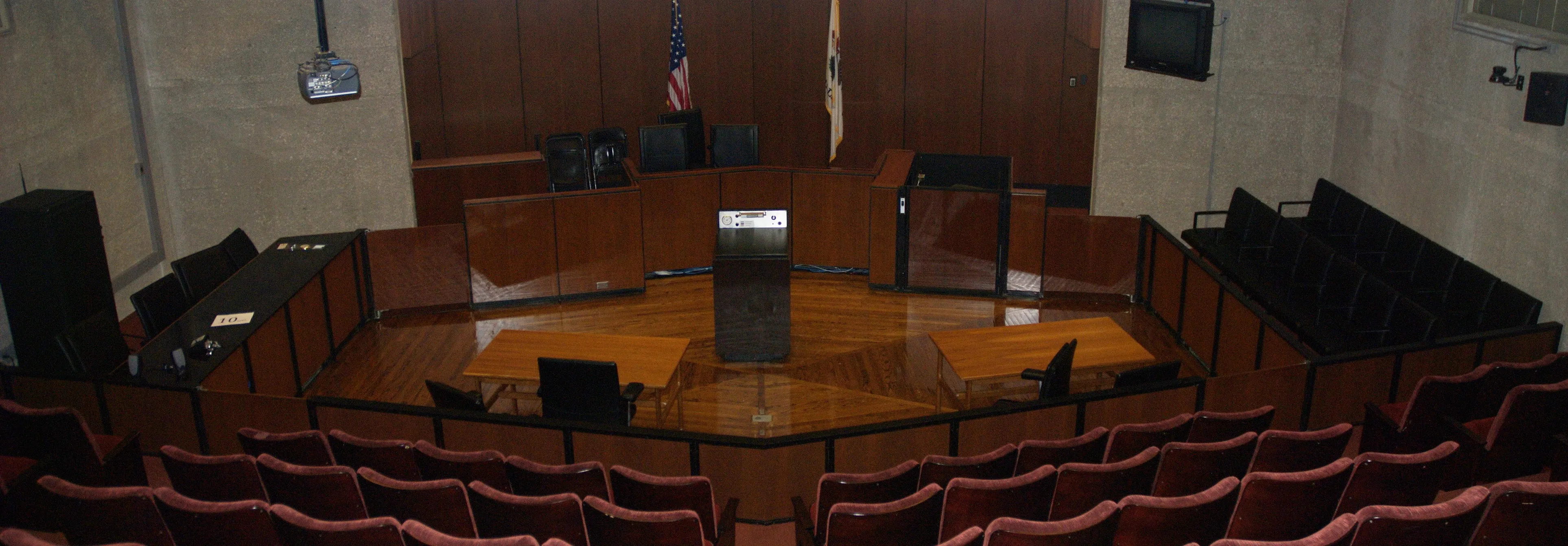US Court of Appeals for the Federal Circuit Hears Arguments at the Law School

The United States Court of Appeals for the Federal Circuit heard oral arguments in the Weymouth Kirkland Courtroom of the University of Chicago Law School earlier this week, giving students, faculty, and other members of the community a chance to see the court in action.
The Federal Circuit—the only court of appeals with a jurisdiction based on subject matter rather than location—regularly hears arguments outside of Washington, DC, as part of its requirement to provide “reasonable opportunities to citizens to appear before the court.” The court, which was formed in 1982 by the merger of the United States Court of Customs and Patent Appeals and the appellate division of the United States Court of Claims, has nationwide jurisdiction in a variety of subject areas, including international trade, government contracts, patents, trademarks, certain money claims against the United States government, federal personnel, veterans' benefits, and public safety officers' benefits claims.
“This was an incredibly valuable experience for the Law School community—faculty and students alike,” said Jonathan Masur, the John P. Wilson Professor of Law, who teaches patent law at the Law School.
“We spend our time teaching students how judges make decisions, and which aspects of a case they will view as important or decisive,” Masur said. “Here, they had the opportunity to watch appellate judges shed light on the very same concepts, all in the Law School’s own courtroom.”
Jordan Poole, ’20, had never seen the Federal Circuit—or any appellate court—in action.
“I am really grateful for the experience, particularly after having done my own oral argument last spring as a 1L,” she said. “It was great to watch the attorneys at work. It was also really informative to see the back and forth between the bench and lawyers and to think about what level of preparation and mastery is necessary for articulating convincing arguments.”
The panel of three Federal Circuit judges—Sharon Prost, the chief judge; Kimberly A. Moore, and Richard G. Taranto—heard three cases related to whistleblower claims, as well as a patent infringement case.
Gabriel Lazarus, ’19, said his biggest takeaway from this and other court proceedings was seeing that “the attorneys who argue before them are people too.”
“It’s healthy for law students to see that [attorneys] find occasions to inject levity into the process, and that when they make mistakes they can laugh at themselves,” he said. “I was also happy with the array of issues we heard. Though all three cases I listened to pertained to whistleblower claims, the issues being argued ranged from justiciability to the factual sufficiency of certain forms of evidence. It was also fascinating to hear an attorney making policy arguments similar to what we may discuss in class, and witness how well (or poorly) that reasoning goes before a panel.”
Law School JSD candidate Ramon Feldbrin, LLM ’16, who is studying the procedural rules that courts apply in constitutional cases in the United States, Germany, and Israel, stopped by to see the patent infringement case. He was particularly interested in the Federal Circuit’s tradition of hearing cases at locations around the country, a move that separates the idea of a “court” from the physical idea of a “courtroom.” It’s something he’s considered in his work studying the German Constitutional Court, which is located more than 300 miles from the Germany's capital, Berlin—away from the other branches of government.
“We usually take for granted the fact that a court is physically fixed to a specific location, usually nearby other governmental institutes or at a central public site,” Feldbrin said. Those who decided to cut off the German Constitutional Court from the capital believed that it would help the court to maintain its independence, he explained.
“But even in the German case the Constitutional Court is fixed to a specific location, Karlsruhe. The fact that the Federal Circuit hears cases in different locations throughout the United States is another example that undermines the physical aspect of a court and, in turn, should make us think about what it is all about,” he said. “I believe that this experience could remind us that a court is not so much a physical place—a court is really all about the process that goes on between a number of judges and the litigants before them. And that process for making justice can theoretically take place at nearly any location. Indeed, our society might benefit if we take it once in a while out from the ‘ivory towers’ that are the traditional courthouses, make it more accessible, and bring it to the people. Wouldn't it be wonderful if the Supreme Court would hold high profile constitutional cases hearings in different cities across the country?”
The Federal Circuit also heard arguments this week at other Chicago-area law schools and at the federal courthouse in Chicago.